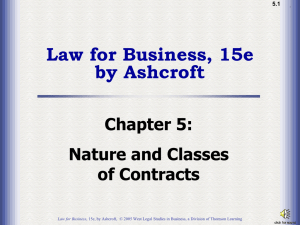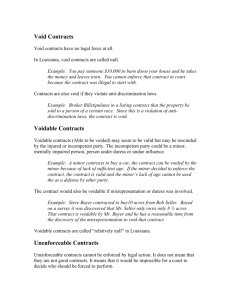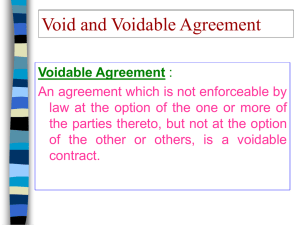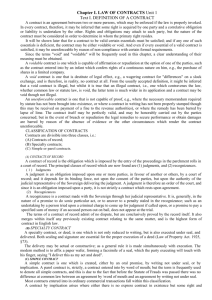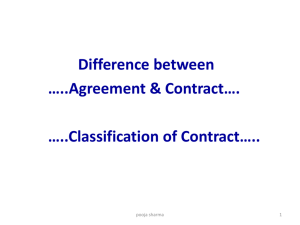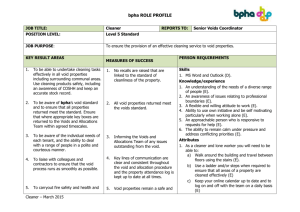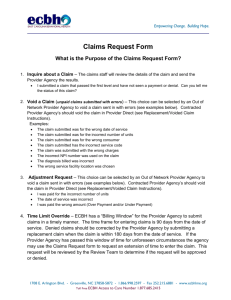Contracts may be classified according to their
advertisement
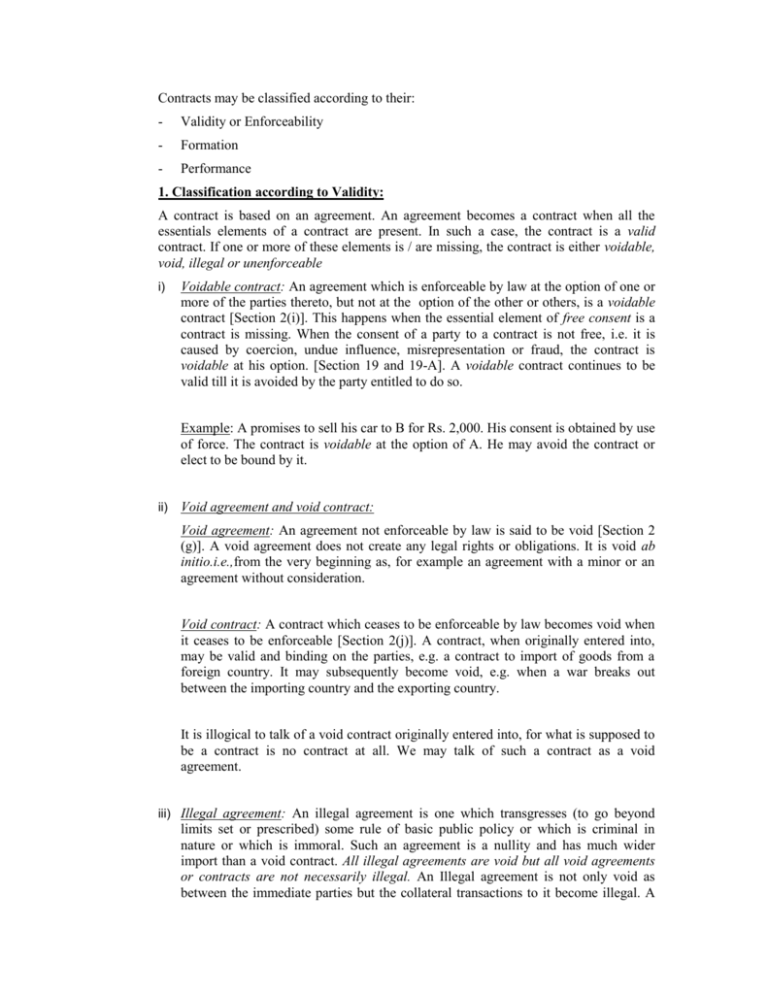
Contracts may be classified according to their: - Validity or Enforceability - Formation - Performance 1. Classification according to Validity: A contract is based on an agreement. An agreement becomes a contract when all the essentials elements of a contract are present. In such a case, the contract is a valid contract. If one or more of these elements is / are missing, the contract is either voidable, void, illegal or unenforceable i) Voidable contract: An agreement which is enforceable by law at the option of one or more of the parties thereto, but not at the option of the other or others, is a voidable contract [Section 2(i)]. This happens when the essential element of free consent is a contract is missing. When the consent of a party to a contract is not free, i.e. it is caused by coercion, undue influence, misrepresentation or fraud, the contract is voidable at his option. [Section 19 and 19-A]. A voidable contract continues to be valid till it is avoided by the party entitled to do so. Example: A promises to sell his car to B for Rs. 2,000. His consent is obtained by use of force. The contract is voidable at the option of A. He may avoid the contract or elect to be bound by it. ii) Void agreement and void contract: Void agreement: An agreement not enforceable by law is said to be void [Section 2 (g)]. A void agreement does not create any legal rights or obligations. It is void ab initio.i.e.,from the very beginning as, for example an agreement with a minor or an agreement without consideration. Void contract: A contract which ceases to be enforceable by law becomes void when it ceases to be enforceable [Section 2(j)]. A contract, when originally entered into, may be valid and binding on the parties, e.g. a contract to import of goods from a foreign country. It may subsequently become void, e.g. when a war breaks out between the importing country and the exporting country. It is illogical to talk of a void contract originally entered into, for what is supposed to be a contract is no contract at all. We may talk of such a contract as a void agreement. iii) Illegal agreement: An illegal agreement is one which transgresses (to go beyond limits set or prescribed) some rule of basic public policy or which is criminal in nature or which is immoral. Such an agreement is a nullity and has much wider import than a void contract. All illegal agreements are void but all void agreements or contracts are not necessarily illegal. An Illegal agreement is not only void as between the immediate parties but the collateral transactions to it become illegal. A collateral transaction is one which is subsidiary, incidental or auxiliary to the principal or original contract. Example: B borrows Rs. 5,000 from A and enters into a contract with an alien to import prohibited goods. A knows of the purpose of the loan. The transaction between B and A is collateral to the main agreement. It is illegal since the main agreement is illegal. If the main agreement is void, the collateral transactions to it are not affected. In the above case, if B had entered into a void agreement with a minor, the contract between B and A would not have been affected. iv) Unenforceable contract: An unenforceable contract is one which cannot be enforced in a court of law because of some technical defect such as absence of writing or where the remedy has been barred by lapse of time. The contract may be carried out by the parties concerned; but in the event of breach or repudiation of such a contract, the aggrieved party will not be entitled to the legal remedies. 2. Classification according to formation A contract may be made in writing or by word of mouth, or inferred from the conduct of the parties or the circumstances of the case. These are the modes of formation of a contract. The contracts may be classified according to the mode of their formation as follows: i) Express contract: If the terms of contract are expressly agreed upon (whether by words spoken or written) at the time of formation of the contract, the contract is said to be an express contract. Where the offer or acceptance of any promise is made in words, the promise is said to express. [Section 9]. An express promise results in an express contract. ii) Implied contract: An implied contract is one which is inferred from the acts of or conduct of the parties or course of dealings between them. It may result from a continuing course of conduct of the parties. Where the proposal or acceptance of any promise is made otherwise than in words, the promise is said to be implied [Section 9]. An implied promise results in an implied contract. Examples: There is an implied contract when A – a) gets into a public bus, or b) takes a cup of tea in a restaurant, or c) obtains a ticket from an automatic weighing machine, or d) lifts B’s luggage to be carried out of the railway station. Example: A fire broke out in P’s farm. He called upon the Upton Fire brigade to put out the fire which the latter did. P’s farm did not come under the free service zone although he believed to be so. Held, he was liable to pay for the service rendered as the service was rendered on an implied promise to pay [Upton Rural District Council V Powell (1942) All E.R. 220]. iii) Quasi Contract: Strictly speaking, a quasi contract is not a contract at all. A contract is intentionally entered into by the parties. A quasi contract, on the other hand, is created by law. It resembles a contract in that a legal obligation is imposed on a party who is required to perform it. It rests on the ground of equity that “a person shall not be allowed to enrich himself unjustly at the expense of another”. Example: T, a tradesman, leaves goods at C’s house by mistake, C treats the goods as his own. C is bound to pay for the goods. E – Commerce contracts An E-commerce contract is one which is entered into between two parties via internet. In internet, different individuals or companies create networks which are linked to numerous other networks. This expands the are of operation in commercial transactions for any person. 3. Classification according to performance To the extent to which the contracts have been performed, these may be classified as i) Executed contract: “Executed” means that which is done. An executed contract is one in which both the parties have performed their respective obligations. Example: A agrees to paint a picture for B for Rs. 100. When A paints a picture and B pays the price, i.e. when both the parties perform their obligations, the contract is said to be executed. In some cases, even though the contract may appear to be completed at once, its effects may still continue. Thus when a person buys a bun containing a stone and subsequently breaks one of his teeth, he has right to recover damages from the seller [Chaproniere V. Mason (1905) 21 TLR 633]. ii) Executorty contract: “Execturory means that which remains to be carried into effect. An executory contract is one which both the parties have yet to perform their obligations. Thus in the above example, the contract is executory if A has not yet painted the picture and B has not paid the price. Similarly, if A agrees to engage B as his servant from the next month, the contract is executory. A contract may sometimes be partly executed and partly executory. Thus if B has paid the price to A and A as not yet painted the picture, the contract is executed as to B and executory as to A. iii) Unilateral or one sided contract: An unilateral or one-sided contract is one in which only one party has to fulfill his obligation at the time of the formation of the contract, the other party having fulfilled his obligation at the time of the contract or before the contract comes into existence. Such contracts are also known as contracts with executed consideration. Example: A permits a railway coolie to carry his luggage and place it in a carriage. A contract comes into existence as soon as the luggage is placed in the carriage. But by that time the coolie has already performed his obligation. Now only A has to fulfill his obligation i.e. pay the reasonable charges to the coolie. iv) Bilateral Contract: A bilateral contract is one in which the obligations on the part of both the parties to the contract are outstanding at the time of the formation of the contract. In this sense, bilateral contracts are similar to executory contracts and are also known as contracts with executory consideration. Classification of contracts in English Law Contract of record: It is either a judgment of a court or recognizance. A Judgment is an obligation imposed by a court upon one or more persons in favour of another or others. In real sense, it is not a contract, as it is not based upon any agreement between two parties. Recognizance is a bond by which a person undertakes before a court or magistrate to observe some condition e.g. to appear on summons. Contract under seal: A contract under seal is one which derives its binding force from its form alone. It is in writing and signed, sealed and delivered by the parties. It is also called a deed or a speciality contract
